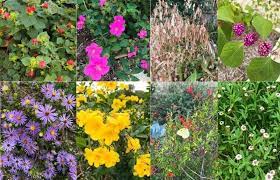The focus on well-manicured lawns and exotic plants in many U.S. home backyards has affected the natural ecological balance. Restoring native plant gardens is the answer to revitalizing the ecology and securing the survival of unique bird and insect species. Native plants have many beneficial qualities, and planting them in their natural habitat helps them thrive. Here are five interesting facts about native plants:
1. Require Little Maintenance
Maintaining a lush green lawn can be frustrating since they often require regular maintenance. Hiring a professional to help grow a lawn can be expensive, and sometimes, the results may not be guaranteed. Native plants are hardy and disease-resistant, so they thrive better in their natural habitat. They need little to no maintenance.
Unlike exotic plants that can be stagnant in their capabilities, some native plants can evolve. Native plants adapt to particular environments and grow harmoniously with the area’s soil, climate, and environment. In drier regions, such plants acclimate and grow deeper roots and thinner leaf systems to control water absorption and evaporation. Adaptation can increase the chances of the plant’s survival amidst the area’s harsh climatic conditions.
2. Create Healthy Spaces for Living Organisms
Local living organisms can get food and habitat from native gardens, helping them survive. Some exotic plants contain toxins that discourage animal habitats and bar them from feeding. Exotic plants also lack persistence and the ability to withstand nature, so you might not have a thriving garden all year round.
Native plants are hardy and will create a natural ecosystem in your backyard. The native plants in their original environment add life to your garden. Bees, butterflies, and birds find natural pastures and habitats as they help your garden develop through pollination. Restoring biodiversity creates a symbiotic relationship among living organisms, improving ecological balance.
Homeowners often use pesticides to boost the survival chances of exotic plants and end up polluting the soil. Soil pollution affects component balance, reducing its ability to support life. Native plants reduce the need for insecticides for your garden, reducing pollution and creating room for microscopic organisms in the soil. Such organisms help break down organic matter and improve soil structure in your garden.
3. Help Combat Climate Change
Climate change is a global concern stemming from air and soil pollution. Greenhouse gases and chlorofluorocarbons (CFCs) from appliances and products we use daily are released into the ozone layer. Constant lawn trimming also means noise and carbon gases from your lawn mower’s exhaust. You can help solve the climate change problem by investing in native plants.
Using native plants on your landscape reduces the need for constant manicuring, reducing noise and air pollution. Native plant gardens can have trees like maples and oaks that live long and effectively store greenhouse gases. Native plants are also ecologically resilient and help control flooding and prevent waterlogged soil.
4. Maintain Curb Appeal Even With Seasonal Changes
Many exotic plants wither down and die due to seasonal changes affecting their development. This can leave your lawn or backyard garden bare during fall and winter. You can transform your lawn by investing in native plants to restore biodiversity.
Some native plants have unique properties that help them comfortably adapt to seasonal changes, giving your backyard an impressive look. You may have showy flowers in spring, enjoy the leafy greens in summer, and get abundant and colorful fruits and seeds in autumn. The vibrant colors create impressive outdoors you can enjoy all year long.
5. Can Help Eliminate Pests
Pests and insects like mosquitos are drawn to some exotic ornamental plants in your backyard. This might explain why they camp around your home and wreak havoc on your property. Native plants can produce compounds that pests despise and attract wildlife that feeds on such insects. Having such plants in your backyard can help keep the pests away, protecting your property and reducing the risk of diseases from insect bites.
Invest in Native Plant Gardens
Native plants help restore ecological balance and biodiversity by attracting wildlife. Such ecosystems provide sustainability for many living organisms and help combat climate change. Due to the resilience of native plants, you can get a thriving garden all year round.





Be First to Comment